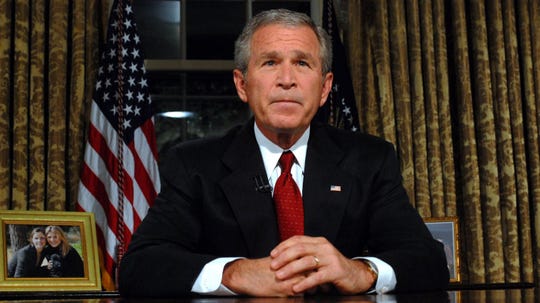House votes to repeal 2002 war resolution that paved way for Iraq invasion
WASHINGTON – The House voted on Thursday to repeal the nearly two-decade old war resolution that paved the way for the U.S. military invasion of Iraq, which proponents said marked a first step toward halting America’s “forever wars.”
The House has approved similar measures before, but they died in the Senate when Republicans were in power. This time is different: the Senate’s Democratic leadership has vowed to take up the measure, and the White House has also endorsed it.
“The Iraq war has been over for nearly a decade,” Senate Majority Leader Chuck Schumer, D-N.Y., said Wednesday in announcing his support for the repeal.
Schumer and other proponents argued the 2002 measure is irrelevant, unnecessary and subject to abuse.
During Thursday’s debate, House Speaker Nancy Pelosi, D-Calif., said the “outdated” authorization has been used “as a blank check to conduct unrelated military operations” and leaving it on the books risks further abuse.
Republicans argued the 2002 measure was still vital to U.S. national security, noting that Iranian-backed militias are now operating in Iraq.
“The murderous Iranian regime has armed proxy organizations to kill Americans and innocent Iraqis,” said Alabama Rep. Mike Rogers, top Republican on the House Armed Services Committee. “This is a bad deal for our national security and the safety of American servicemembers overseas.”
Rogers and other GOP lawmakers said Congress should update the 2002 authorization, not nix it.
The Trump administration cited the 2002 Iraq resolution in its legal justification for the U.S. drone strike that killed Iranian general Qassem Soleimani. Trump officials said the strike against Soleimani – which occurred in Iraq – was a “defensive action” because the Iranian general was plotting attacks on American diplomats and service members.
But the move infuriated Iraqi leaders who cited it as a breach of their country’s sovereignty. And in the U.S., legal and military experts said there was “no plausible argument” that the 2002 Iraq measure gave the White House legal authority to kill Soleimani.
The 2002 measure authorized then-President George W. Bush to “use the Armed Forces of the United States as he determines to be necessary and appropriate in order to … defend the national security of the United States against the continuing threat posed by Iraq.”
Sen. Tim Kaine, D-Va., the chief sponsor of a Senate bill to repeal the measure, said he couldn’t remember the last time Congress repealed a war authorization. Kaine’s co-sponsor is Republican Sen. Todd Young of Indiana.
“We pass them and then they just float out there like these zombies that can be used for mischief,” Kaine told reporters on Capitol Hill Wednesday. He said the prospects for Senate passage are “very high” and he expects significant GOP support.
The 2002 Iraq war resolution has long been controversial because the Bush administration argued at the time that Hussein’s regime was hiding weapons of mass destruction, an assertion that turned out to be wrong. And while many hailed the demise of former Iraqi dictator Saddam Hussein, the war left Iraq vulnerable to influence from Iran and wracked by internal sectarian violence.
“The Bush administration misled the American people by saying there were weapons of mass destruction in Iraq that Iraq posed an imminent threat, and by drawing a false connection between the tragic events of 9-11 and Saddam Hussein,” said Rep. Barbara Lee, D-Calif., the chief sponsor of the House bill. “Those lies and misinformation had deadly consequences. The mistakes continue to haunt us today.”
Among Americans, the war became increasingly unpopular as it dragged on for years and claimed the lives of more than 4,400 U.S. troops.

The terror attacks of Sept. 11, 2001 took place during Bush's first year in office. (Photo: Pool / Getty Images)
The House bill won bipartisan support and passed by a vote of 268 to 161, with 49 Republicans joining nearly all Democrats in voting for the bill.
The Senate Foreign Relations Committee will take up its version of the Iraq war bill on June 22. Their proposal would also repeal the 1991 authorization for the first Gulf War.
“Saddam Hussein’s regime is gone … and Iraq is now a close security partner who should not be labeled an enemy state,” Kaine said. Schumer said he would work with the committee’s chairman, Sen. Bob Menendez, D–N.J., on timing for a full Senate vote.
The Biden administration announced its support for the measure on Monday, saying the U.S. has “no ongoing military activities” that rely solely on the 2002 authorization and repealing it would not affect current American military operations.
Many Democrats hope Thursday’s vote will be just the start of a broader push to limit the president’s war powers and either nix or narrow other military force authorizations. Next up on their wish list: repealing the 2001 authorization for military force that Congress passed to give Bush the power to target al-Qaeda, the terrorist group responsible for the September 11 attacks.
That measure is much broader than the Iraq war authorization and it has been used as a legal justification for strikes against ISIS in Syria and other terror groups around the globe.
The Biden administration has signaled a willingness to work with lawmakers who want to repeal that authorization and replace it with a narrower measure that still gives President Joe Biden the power to target terrorist groups that threaten the U.S.
“As the administration works with the Congress to reform (authorizations for use of military force), it will be critical to maintain the clear authority to address threats to the United States’ national interests with appropriately decisive and effective military action,” the White House said in its statement on Monday.
More:
Pompeo sidesteps questions about ‘imminent’ threat posed by Iran’s Soleimani
‘A reckoning is near’: America has a vast overseas military empire. Does it still need it?
Biden puts a twist on ‘America First’ even as he moves to unravel Trump’s foreign policy

Believing Saddam Hussein had weapons of mass destruction, U.S. troops invaded Iraq in 2003 and overthrew his regime. (Photo: Chief Mass Communication Specialist Michael B. W. Watkins / Getty Images)
Source: Read Full Article

